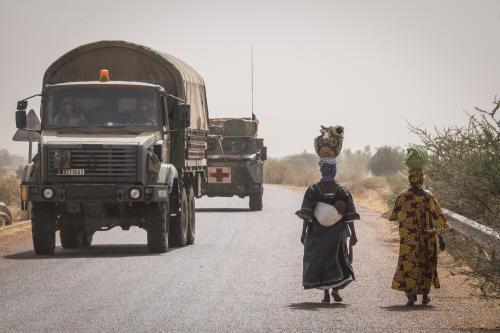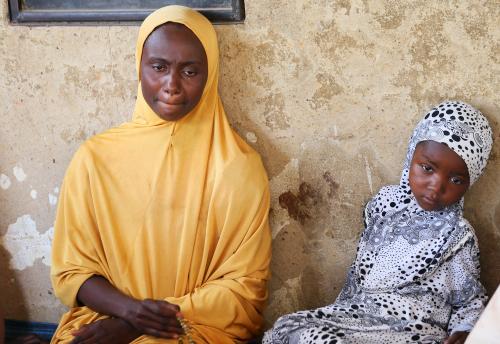Since profiling impinges on civil liberties, it bears a negative connotation particularly when narrowly based on nationality, race or religion. The U.S. Transportation Security Administration (TSA) has just instituted a nationality-based criterion, under which travelers from a list of 14 countries are subject to special airport screening procedures. Controversy has naturally ensued.
Arguments about the morality and constitutionality of these new requirements are being voiced. While important, these tend to mask the urgent and practical “effectiveness” question: Will screening travelers from a list of 14 nations make travel safer?
First, let us briefly “profile” the countries on this new TSA list based on their performance in the relevant dimensions of the Worldwide Governance Indicators (WGI) that we produce annually.
On the governance indicator measuring political instability and major violence/terror, the 2008 data show that seven countries on the TSA’s list, namely Yemen, Pakistan, Afghanistan, Iraq, Nigeria, Somalia and Sudan are among the very bottom of the 210 countries analyzed. These seven countries also score poorly in most every other governance dimension, including voice and democratic accountability, control of corruption and rule of law. In addition to this “profile” being consistent with that of failed states, it also shows the extent of challenges faced by Yemen in recent years, suggesting that the sudden U.S. and international attention on the country is long overdue.
The governance realities among the rest of the countries on the TSA list are more nuanced. While they face enormous challenges, it would be a misnomer to characterize them as failed or quasi-failed states. In terms of political instability and major violence, Iran for instance does not place at the bottom among countries in the world, although it has experienced a major deterioration throughout the decade. Similarly, while Lebanon rated better than 50 other countries in the world in 2000, by 2008 it had joined the ranks of the bottom 10 in terms of political instability and major violence.
The “middling” ratings that the WGI confers to Libya and Saudi Arabia for political stability (as well as the “mediocre” scores for Syria) suggest that these countries manage to maintain a semblance of political stability, but at the expense of voice and democratic accountability. Notably, even with a modicum of political stability, Libya, Saudi Arabia and Syria have been unable to control terrorism, and in some instances tolerated or even sponsored it.
On the other hand, the outlier on this TSA list is Cuba, which may have been included for politically expedient and historical reasons, rather than due to current evidence about their governance performance in general or of specific terrorist threats in particular. Cuba, while performing satisfactorily on political stability and absence of violence, scores very low on voice and democratic accountability. Yet such dimension on its own is not an effective predictor—countries like China, which have low ratings, were not included. Furthermore, countries like Russia are also not in the list, with low ratings on democratic accountability and despite of its checkered history related to (internal) terrorism, which has doomed passenger airplanes and trains.
Based on the governance profile of the TSA’s 14 country list, it thus appears that multiple (and shifting) considerations were applied to decide on inclusion (and exclusion). A few countries appear to be there because they sponsor or tolerate terrorism, others are very weak states exhibiting an unstable environment in which terrorist operations may thrive, and others may have been included for historical and political reasons. The main question still remains: will targeting these 14 countries for profiling their citizens while traveling make our skies safer?
While it is true that the numbers of would-be terrorists residing in failing or sponsoring states are likely to be higher than in other countries, most countries in the world have potential terrorists in their midst. Consider for instance names such as Padilla, McVeigh, Reid, Lindsay, Gadahn, Lindh, to mention a few of OECD origin. Thus, targeting a list of only 14 countries will be ineffective and inefficient, since many potential terrorists will be missed and although all travelers from these countries will be screened, only a tiny portion of them will actually pose a terrorist threat.
Instead of focusing on nationality as a profiling devise for travel screening, a different and multi-pronged strategy may prove more effective. It would entail shifting away from national identity (and obsession with toothpaste…) toward a focus on the individual traveler—reviewing their passports and visas, observing their behavior, and making effective use of a well-integrated background database of individuals of concern.
First, it is both more cost-effective and efficient to study a person’s passport, with the wealth of information it provides than to engage in coarse nationality-based screening. Second, telltale signs from passenger behavior provide important information to the trained (and electronic) eye, as we have learned from the Israelis.
Third, we should use the existing database resources more effectively: all required information about Umar Abdul Mutallab was available, including a damning official report from his own father. As President Obama stated aptly: “This was not a failure to collect intelligence, it was a failure to integrate and understand the intelligence that we already had… Our intelligence community failed to connect those dots.” Had they been connected, Mutallab would not have boarded the flight, and no nationality profiling would have been necessary.
Fourth, in addition to using the above people-based strategies, it makes sense to also continue random screenings. This is because terrorist groups strive to learn to beat any preset system. In fact, it is for this reason that nationality-based profiling is likely to be less effective than exclusively relying on random screening.
Finally, instead of compiling a list to assist in the profiling of foreign nationals, a list of countries that pose medium-term terrorist threats due to current levels underdevelopment and poor governance does make eminent sense. Those countries should be pro-actively engaged in a medium-term strategy to support improved governance, development, and state-building. Even if some overlap took place, the composition of such a “governance and development-oriented” list would differ from the list of 14 that the TSA has compiled for profiling.



Commentary
Op-edWill Profiling Make our Skies Safer? A Governance Perspective on New TSA Guidelines
January 7, 2010